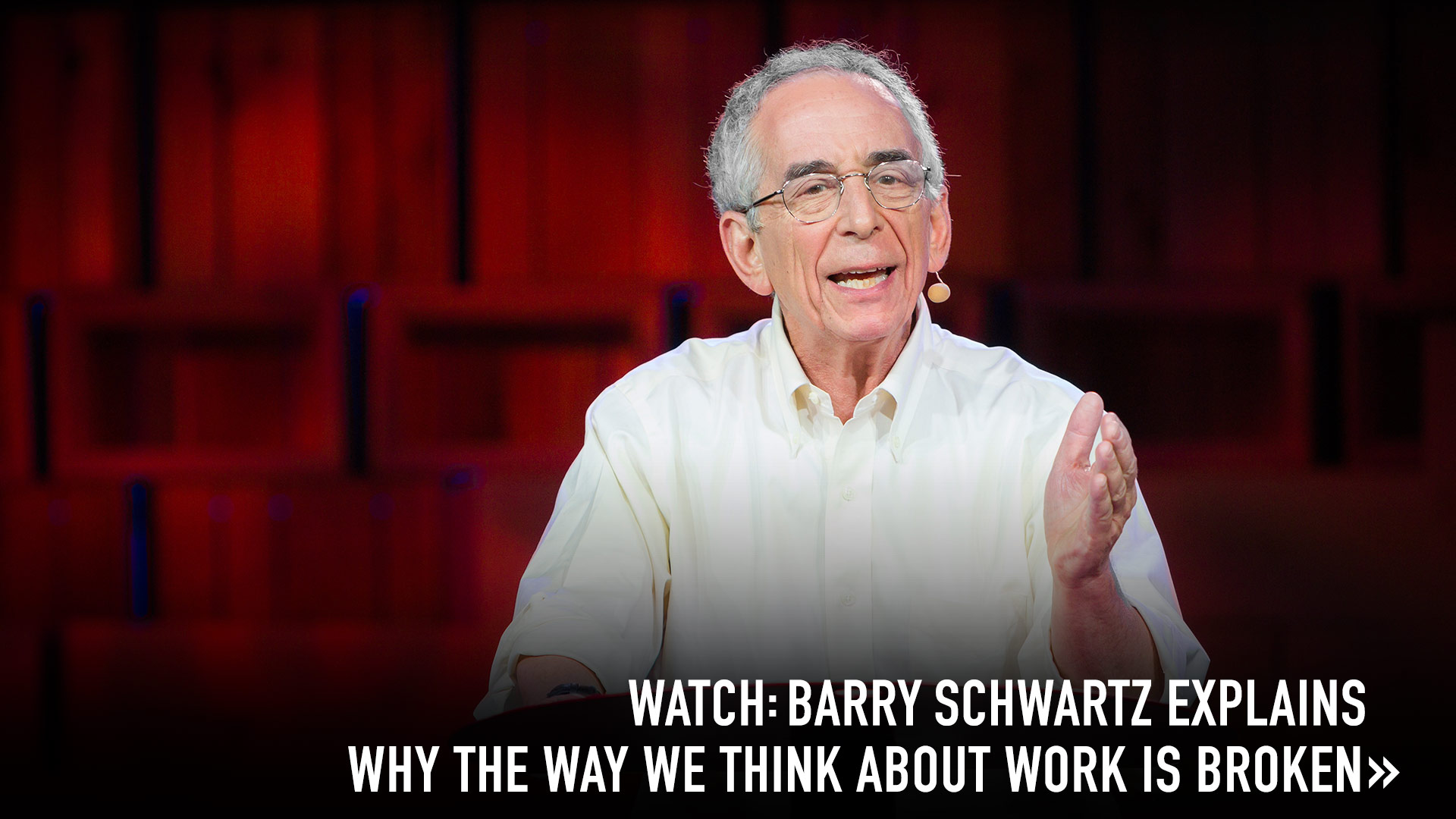
Psychologist Barry Schwartz explores the meaning and engagement that some workers feel about professions you might not expect to be fulfilling.
Why do we work? Why do we drag ourselves out of bed every morning instead of living lives composed of one pleasure-filled adventure after another? What a silly question. We work because we have to make a living. Sure, but is that it? Of course not. When you ask people who are fulfilled by their work why they do the work they do, money almost never comes up. The list of nonmonetary reasons people give for doing their work is long and compelling.
Satisfied workers are engaged by their work. Satisfied workers have a measure of autonomy and discretion in their work, and they use that autonomy and discretion to achieve a level of mastery or expertise. They learn new things, developing both as workers and as people. And most important, satisfied workers are satisfied because they find what they do meaningful. Their work may make a difference to the world. It may make other people’s lives better.
Almost everyone wants more from work than just a paycheck.
The diverse potential sources of satisfaction from work raise a very big question: Why is it that for the overwhelming majority of people in the world, work has few or none of these attributes? According to a massive report published in 2013 by Gallup, the Washington, D.C.-based polling organization, only 13 percent of workers feel engaged by their jobs. These people feel a sense of passion for their work and they spend their days helping to move their organizations forward. But almost ninety percent of adults spend half their waking lives doing things they would rather not be doing at places they would rather not be.
You might think that routinized, pay-driven, soul-deadening work is just the price we have to pay for productive efficiency. Our souls may be thinner, but our bank accounts are fatter. Or you might think that only a select few people seek meaning and engagement in their work. For the “professional class,” it’s not (just) about the money, but for everyone else, it is.
My book, Why We Work, is intended to show that almost everyone wants more from work than just a paycheck, and that the conditions of our work have a lot to say about whether more is available. We can find plenty of professionals — doctors, lawyers, teachers — who measure their success by the size of their paycheck. But we can also find plenty of non-professionals who often deviate from their job descriptions to make their daily work worth doing.
In this excerpt from the book, I describe the meaning and engagement that some workers derive from some of those professions you might not expect to be fulfilling. And here’s the real point: The fact is, when people have meaningful work, they work harder, smarter, and better, and their companies are more profitable. Given this, it makes you wonder why the heads of companies are leaving money on the table by creating de-skilled work that demeans workers.
1. Hospital custodian
Luke works as a custodian in a major teaching hospital. His job description says nothing about responsibility or care for patients and their families. He has a long list of duties, including to “collect and dispose of soiled linen” and “stock restroom supplies,” but not a single item on the list even mentions interacting with another human being. From the description, Luke could be working in a shoe factory or a mortuary instead of a hospital.
His “official” duties were only one part of his real job.
But Luke was doing a different job than his official description would suggest, as researcher Amy Wrzesniewski discovered when she and her team conducted in-depth interviews with Luke and other hospital custodians. The researchers asked the custodians to talk about their jobs, and the custodians began to tell them stories about what they did. Luke’s stories told them that his “official” duties were only one part of his real job, and that another central part of his job was to make the patients and their families feel comfortable, to cheer them up when they were down, to encourage them and divert them from their pain and their fear, and to give them a willing ear if they felt like talking. Luke wanted to do something more than mere custodial work.
What Luke sought in his work was shaped by the aims— what Aristotle would call the telos—of his organization. The telos of the hospital—promoting health, curing illness, relieving suffering—was embedded in Luke’s approach to his job. The amazing thing Wrzesniewski and her colleagues discovered about Luke and many of his coworkers was that they understood and internalized these aims in spite of their official job description, not because of it. The job they were actually doing was one they had shaped for themselves in light of the telos of medical care. Ben, another custodian, told the researchers how he stopped mopping the hallway floor because a patient who was recovering from major surgery was out of his bed getting a little much-needed exercise by walking slowly up and down the hall. Corey told them about how he ignored his supervisor’s admonitions and refrained from vacuuming the visitors’ lounge while some family members, who were there all day, every day, happened to be napping. These custodians shaped their jobs with the central purpose of the hospital in mind.
Luke, Ben, and Corey were not generic custodians; they were hospital custodians. They saw themselves as playing an important role in an institution whose aim is to see to the care and welfare of patients.
2. Carpet maker
About twenty years ago, Ray Anderson, the late CEO of the immensely successful carpet manufacturer Interface had what he described as an epiphany. Here he was, with more money than he or his heirs would know what to do with, when he realized that his company was poisoning the environment. Carpet making is (or was) a petroleum-intensive industry, and Interface’s environmental footprint was huge. Anderson wondered what good it would do to leave his grandchildren great wealth if the price of accumulating that wealth was an uninhabitable planet. So Anderson resolved to transform every aspect of Interface’s operations, moving to achieve a zero footprint goal by 2020. He assumed that the development of new production processes and a commitment to pollution control would cost money—a lot of it. But he was willing to sacrifice the bottom line to achieve a social good.
You don’t need to work for an organization that saves lives to find meaning and purpose in what you do.
So Interface began a journey to change what it makes, how it makes it, and what it does with its waste. As of 2013, it had cut energy use in half, shifted to renewable energy, and cut waste to a tenth of what it was. How much profit was sacrificed? None at all! Interface employees were so motivated by the opportunity to work for the common good, and challenged by the need to find innovative modifications of the production process, that their work became much more effective and efficient.
And the company, realizing that its new mission would demand creative partnership from top to bottom of the organization, flattened its hierarchy and gave employees much more discretion and control over what they did. The strength of the company’s shared vision encouraged collaboration and cooperation. Progress toward sustainability required creative solutions. So a culture that encouraged openness and allowed for failure emerged.
The result of Anderson’s vision, twenty years out, is a company that remains extremely successful and is populated by employees who are eager to come to work every day. He documented the transformation of Interface in his 2009 book, Confessions of a Radical Industrialist: Profits, People, Purpose—Doing Business by Respecting the Earth, and in his TED Talk: “The business logic of sustainability.” You don’t need to be working for an organization that saves lives to find meaning and purpose in what you do. You just need to be doing work that makes people’s lives better.
3. Hair stylist
It’s true that the people who work at Interface don’t save lives, but they are on a mission to save the planet. Few of us can find such a noble calling in what we do. What about people whose work is not globally impactful—restaurant servers, plumbers, roofers, welders, hairdressers, and office workers? Here, too, it is possible to find enormous meaning and satisfaction in what you do.
Mike Rose interviewed people with everyday, blue-collar jobs in The Mind at Work. His chapter on hairdressers is particularly eye opening. To be sure, hairdressers need to acquire a set of technical skills—for cutting, coloring, and styling hair. And many, perhaps most of them, see what they do as requiring a fair amount of creativity. But what makes the job meaningful, I think, is the skill they acquire in interacting with clients. What does a client mean when she says she wants this haircut a little “fresher”? How do you talk a client out of a haircut that looks great on the long, angular face of the model whose photo she has brought in but will look terrible on the client’s pumpkin-shaped face? How do you help clients feel good about their appearance — confident as they leave the shop to face the world? The hairdressers Rose interviewed were proud of their technical skills and reveled in the complexity of such a seemingly simple act as cutting hair. But they were also proud of their ability to understand, talk to, and manage people. This was an essential part of their job. And doing it well could make a big difference to the quality of the lives of the people they served.
Virtually any job has the potential to offer people satisfaction.
“It’s important to hear my client,” said one stylist. “The consultation is the most important moment of the haircut.” “Don’t assume you know what they want,” said another stylist, “because they may not even know what they want.” Another stylist pointed out that a client will say, “I want an inch off,” then show you two inches with her fingers. Appreciative clients say things like this about their stylists: “She listens.” She “respects what I want.” She “sees what I mean.” Stylists who love their work love its technical complexity and room for creativity. But also “I just like making people happy. . . . People leave my chair happy because of what I did for them. You really don’t get that out of too many jobs, you know, that you’re gonna affect people like that.” Another stylist observed that “This is a business that is unlike most; there’s something very nurturing about it. It is one of the few places in our society where you have permission to touch people. It’s so intimate. We humans have a need for connection.”
The lesson from the custodians, the carpet makers, and the hairdressers is that virtually any job has the potential to offer people satisfaction. Jobs can be organized to include variety, complexity, skill development, and growth. They can be organized to provide the people who do them with a measure of autonomy. And perhaps most important, they can be made meaningful by connecting them to the welfare of others.
Why We Work by Barry Schwartz (TED Books/Simon & Schuster) is available now.
Featured image courtesy iStock.















